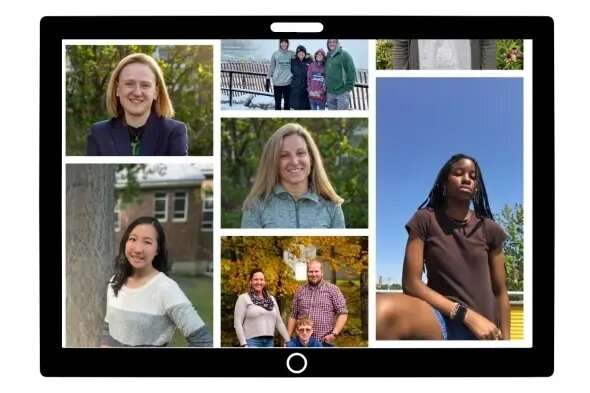This article has been reviewed according to Science X's editorial process and policies. Editors have highlighted the following attributes while ensuring the content's credibility:
fact-checked
trusted source
proofread
Fostering a more racially inclusive rural America

Associate Professor of Sociology Emily Walton recalls chatting with a multiracial physician who told her that he'd made more friends in Colorado, where he spent one year during his residency, than he had in nearly a decade of living in rural New England.
Similarly, a Native American man told Walton how he and his family feel more like "accepted guests" in the area than genuine members of the community.
The interviews were part of a newly published study in Rural Sociology that Walton led in an effort to deconstruct the "chilly" culture people of color sometimes encounter in Northern New England
"These two examples reflect countless stories among the individuals I spoke with and represent a broader phenomenon I call 'misrecognition,'" Walton says. "Unlike prejudice—when one judges another based on their previous experience or ideas about their group's characteristics—misrecognition represents the failure to see the common humanity of another person. At an extreme, those who are misrecognized 'do not matter' in the community."
As rural America undergoes a demographic transition, with white populations declining and racial minorities increasingly relocating to small towns, Walton's research pinpoints a subtle way predominantly white communities often alienate people of color.
"The nonwhite people I interviewed don't talk much about acts of aggression or hate from white residents, but they do feel overlooked and ignored in public settings and at work," Walton says. "These subtle acts of nonattention are essential, yet little understood, components of racial exclusion that cement social boundaries between racial groups."
Deconstructing cues
Walton first began to understand how white culture underlies racial inequality when she was studying mental health disparities among Asian and Latinx Americans in graduate school.
"I thought, as a white woman, I should take advantage of my privileged position to take a good, hard look at the ways in which defending white people's status at the top of the racial hierarchy keeps nonwhite people down," Walton recalls. "In situations where people of different races are ostensibly equal—like 'integrated' neighborhoods, schools, and workplaces—the processes through which we uphold racial boundaries are subtle and need deconstruction."
When Walton relocated from Seattle to Lebanon, N.H., with her husband and two daughters in 2012, she observed firsthand how many people in the area described those who were not born in Northern New England as "from away."
"When those 'from away' are not white, this introduces an extra layer of nonbelonging they must navigate," she says. "In my interviews, people of color described feeling misrecognized in that they were not seen and valued by the predominantly white community in the full, complex ways in which they understood themselves."
Walton says that this sense of alienation led many interviewees to feel like they were "surviving, not thriving" and to seek job opportunities that would take them out of the Upper Valley.
"It is unfortunate that the environmental, academic, and employment riches in the Upper Valley are not equally available to people with different racial identities," she adds.
As a white woman, Walton believes she is socialized to be blind to the ways in which her own comfort in the community relies on the exclusion of others who, as one interviewee said, "aren't part of the New England Dream."
"I was often surprised when people shared experiences where they were shouted at in restaurants, called names, pulled over by police multiple times a year, and other such overt racist acts," Walton says. "However, my interviewees were very willing to be vulnerable by sharing often difficult stories. They hoped that by sharing their stories, they would help other people of color understand that they were not alone in their feelings."
Over the last few years of data collection, 12 Dartmouth students helped to conduct interviews for the study. "Working with these students has been invaluable for both eliciting stories and developing an analytic narrative that remains true to the respondents' intentions," Walton says.
Rewriting how we define our communities
"The idea of misrecognition describes the common feelings my interviewees expressed of feeling unseen, invalidated, and unworthy in their social interactions in the community," Walton says.
Ultimately, she hopes that her research will help inspire new "symbolic interventions" that broaden the definition of who belongs.
"My hope is that we can actually change the 'chilly' culture to be more inclusive by rewriting the script through which we define ourselves as a community," Walton says. "We can broaden the definition of 'us' to include those who may currently be seen as 'them.'"
Walton's Humans of the Upper Valley, which she launched with Dartmouth students in 2021, attempts to do just that. Inspired by the popular Humans of New York, the project offers snapshots of the life stories of local residents from all walks of life.
As Walton said on a local arts and culture blog, "The point is to create a kind of intimacy with strangers. If we can learn about and relate to others' motivations, their fears, their dreams, maybe we can nurture empathy and understanding."
"By broadly sharing the intimate life stories of different kinds of residents," she says, "I hope that people will find this is a low-barrier, nonthreatening way to connect with and understand each other's humanity."
More information: Emily Walton, Misrecognition and Well‐being in Culturally White Northern New England, Rural Sociology (2023). DOI: 10.1111/ruso.12505
Provided by Dartmouth College



















